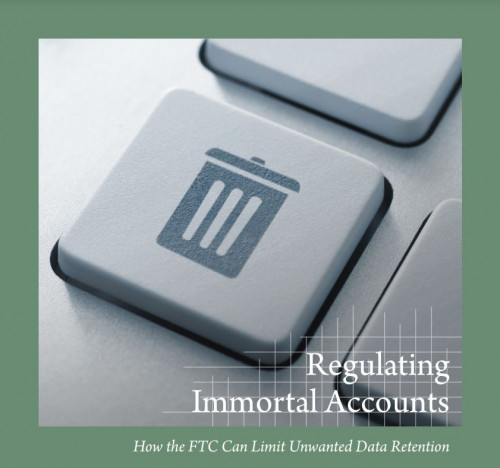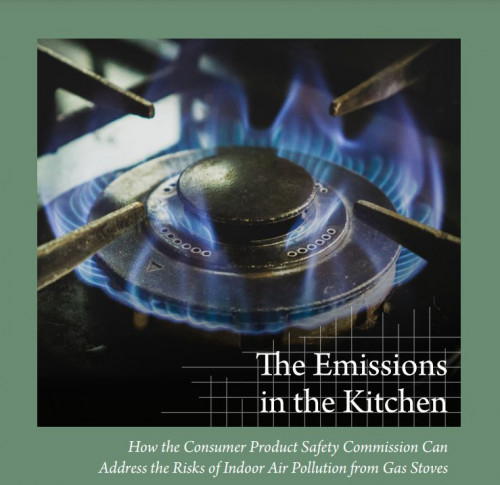-
Regulating Immortal Accounts
How the FTC Can Limit Unwanted Data Retention
The report argues that an FTC rule requiring reasonable cancellation practices for all market actors and providing clear and specific guidelines would address the harms of immortal accounts. Such regulation would fall under the FTC’s authority and advance the Commission’s mission to protect consumers and competition by preventing deceptive, unfair, and anticompetitive business practices.
-
Comments to EPA on Proposal to Reaffirm “Appropriate-and-Necessary” Finding for Regulating Hazardous Air Pollution from Power Plants
In February 2022, the Environmental Protection Agency (EPA) proposed: (1) to revoke its May 2020 finding that it is not appropriate and necessary to regulate coal- and oil-fired electric utility steam generating units (EGUs) under Clean Air Act (CAA) Section 112 (2020 Action), and (2) to reaffirm the Agency's April 2016 finding that it remains appropriate and necessary to regulate hazardous air pollutant (HAP) emissions from EGUs after considering cost (2016 Supplemental Finding). Our comments on the Proposal explain why EPA should finalize both these actions as consistent with the Clean Air Act, case law, executive directives, principles of sound economic analysis, and past agency practice.
-
The Emissions in the Kitchen
How the Consumer Product Safety Commission Can Address the Risks of Indoor Air Pollution from Gas Stoves
Gas stoves are found in over a third of American homes, and these appliances generate dangerous indoor levels of nitrogen dioxide (NO2) and fine particulate matter (PM2.5) within just a few minutes of cooking. This report suggests several ways the Consumer Product Safety Commission (CPSC) can and should take action to address the unreasonable health risks posed by gas stove emissions.
-
Comments to EPA on Proposed Particulate Matter Standards for Aircraft Emissions
The Environmental Protection Agency (EPA) recently proposed airplane pollution standards that will have no effect on emissions and require no technological improvements. We filed comments urging EPA to evaluate a full suite of regulatory alternatives, including more stringent standards that would reduce emissions, and recommend that EPA conduct a distributional analysis to evaluate the impacts of the Proposed Rule and the relative distributional consequences for each regulatory alternative.
These comments were co-written with Clinical Associates Jenna Pearlson and Tanya Shahjanian.
-
Comments on the CPSC’s Proposed Rule for Custom Window Coverings
Policy Integrity filed comments on the Consumer Product Safety Commission's (CPSC) Proposed Rule for custom window coverings, which would require safety features to reduce the strangulation risk from window covering cords. We argue that adding a child premium to the value of statistical life (VSL) is consistent with federal guidance and international regulatory practice. However, if the CPSC chooses to apply a child premium, it should offer a theoretical justification that does not rely on life-years. We also argue that the CPSC has the authority to consider unquantified benefits and should consider avoided parental grief as a benefit of the Proposed Rule, but only to the extent it is not already captured in a child VSL premium. Furthermore, the CPSC should consider avoided litigation costs and recall costs as a quantified or unquantified benefit of the Proposed Rule and use a break-even analysis to better incorporate unquantified benefits.
-
Comments to OCC on Draft Principles for Climate-Related Financial Risk Management for Large Banks
The Office of the Comptroller of the Currency (OCC) has issued Draft Principles for Climate-Related Financial Risk Management for Large Banks. Along with partner organizations, we submitted comments supporting the OCC's Draft Principles and offering potential next steps for the OCC.
-
Comments on OSHA’s Proposed COVID-19 Vaccination and Testing Standard
The Emergency Temporary Standard (ETS), which directs large employers to require COVID-19 vaccines or testing, represents an important step toward reducing the virus in the workplace. While the agency offers numerous compelling justifications for the proposed rule, this comment highlights several additional rationales regarding the legislative and regulatory history of the Occupational Safety and Health (OSH) Act. A blog post on the issue by comment co-authors and NYU Law students Nina Henry and Alex Jonlin is available here.
-
Comments to HHS on Proposed Repeal of the SUNSET Rule
We submitted comments to the Department of Health and Human Services (HHS) supporting its proposed repeal of the SUNSET Rule, which retrospectively and prospectively established an "expiration date" for thousands of HHS regulations. We explain why the SUNSET Rule is arbitrary and capricious, echoing our earlier comments, and and propose ways that HHS can strengthen its justification for repealing the rule.
-
Comments to Federal Transit Administration on Electric Vehicle Equity
We submitted comments in response to the Federal Transit Administration's (FTA) request for information on updating its Title VI Circular, which lays out nondiscrimination requirements for transit providers who receive funding from the agency. Our comments encourage FTA to require the nondiscriminatory distribution of clean vehicles across transit systems and to create the appropriate reporting requirements that would allow the agency to monitor this.
-
Comments to Dept of Labor on ESG Investing by Retirement Plans
We submitted joint comments with partners from the Environmental Defense Fund and the Initiative on Climate Risk and Resilience Law supporting the Department of Labor’s (DOL) revision of Trump-era restrictions on ESG investing by retirement plans.
Viewing recent projects in Consumer and Healthcare Protection






